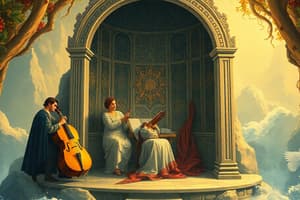Podcast
Questions and Answers
What time period does Renaissance music cover?
What time period does Renaissance music cover?
- 1800-1900
- 1600-1700
- 1200-1400
- 1400-1600 (correct)
What is the defining feature of Baroque Era music?
What is the defining feature of Baroque Era music?
the creation of tonality
Who is a famous composer associated with the Baroque Era?
Who is a famous composer associated with the Baroque Era?
Antonio Vivaldi
What years define the Classical period of music?
What years define the Classical period of music?
Which composer is known for works during the Romantic period?
Which composer is known for works during the Romantic period?
What is the timeframe of the Romantic Era for music?
What is the timeframe of the Romantic Era for music?
What is the main focus of Impressionist music?
What is the main focus of Impressionist music?
What is 'The Hobbit' about?
What is 'The Hobbit' about?
Who wrote 'Screwtape Letters'?
Who wrote 'Screwtape Letters'?
What does 'Autumn' from Vivaldi's 'Four Seasons' depict?
What does 'Autumn' from Vivaldi's 'Four Seasons' depict?
What is 'Arabesque No. 1' associated with?
What is 'Arabesque No. 1' associated with?
Who is the composer of the '1812 Overture'?
Who is the composer of the '1812 Overture'?
What genre does 'Hungarian Dance No. 5' belong to?
What genre does 'Hungarian Dance No. 5' belong to?
Flashcards are hidden until you start studying
Study Notes
Renaissance Music
- Time period: 1400-1600
- Diverse musical styles such as masses, motets, madrigals, and chansons flourished.
Baroque Era Music
- Time period: 1600-1760
- Defined by the creation of tonality; characterized by ornate compositions.
- Expanded size, range, and complexity of instrumental performance.
Key Baroque Composers
- Antonio Vivaldi: Prominent Baroque composer from Italy (1700) known for his violin concertos.
- George Frideric Handel: Influential composer from Germany (1710), renowned for works like "Water Music."
- Johann Sebastian Bach: Key German composer (1720) associated with mastery of counterpoint and harmony.
Classical Period Music
- Time period: mid-1700s to early 1800s
- Features a lighter, clearer texture than Baroque music, with less complexity.
Notable Classical Composers
- Joseph Haydn: Austrian composer (1732-1809) known as a pioneer of the symphony and string quartet.
- Wolfgang Amadeus Mozart: Austrian composer (1765) celebrated for his contributions to classical repertoire, particularly in Vienna.
- Ludwig van Beethoven: Transitioned from Classical to Romantic (1800) while remaining a key German figure in music history.
Romantic Period Music
- Time period: 1815-1910
- Emphasizes emotion, individualism, and nationalism in musical expression.
Notable Romantic Composers
- Felix Mendelssohn: Prominent figure in the early Romantic period from Germany (Early 1830s).
- Frédéric Chopin: Polish composer (1840), famed for his expressive piano works, especially nocturnes.
- Johannes Brahms: German composer active in the 1850s, known for symphonic and choral works.
- Antonín Dvořák: Czech composer from the 1880s associated with nationalism.
- Pyotr Ilyich Tchaikovsky: Russian composer (1885) celebrated for ballets and orchestral music.
Modern Music
- Time period: 20th century
- Influenced by advanced technology, resulting in new musical forms and styles.
Impressionist Music
- Time period: late 19th to early 20th centuries.
- Focuses on suggestion, atmosphere, and the use of new harmonic structures.
Representative Works
- "The Four Seasons - Autumn": Vivaldi’s piece representing the seasonal changes through violin music.
- "Water Music" Suite No. 2: Handel’s suite featuring alternation between brass and strings, structured in sonata form.
- "Violin Concerto in A Minor": Bach’s Baroque-era work using the ritornello form.
- "Piano Concerto No. 21": Mozart’s classical concerto known for its three distinct movements.
- "5th Symphony": Beethoven’s iconic work depicting struggle and triumph, noted for its "Fate" motif.
Notable Literature
- "A Passage to India": E.M. Forster’s 1924 novel addressing racial tensions in British India.
- "Something Beautiful for God": A 1970 work by Mother Teresa and Malcolm Muggeridge reflecting on spirituality.
- "Alice in Wonderland": Lewis Carroll's 1865 classic about a girl’s adventures in a fantastical realm.
- "Robinson Crusoe": Daniel Defoe’s 1719 novel of survival and adventure.
- "Father Brown Mysteries": G.K. Chesterton’s 1910 stories featuring a sleuthing monk.
20th Century Compositions
- "Rite of Spring": Igor Stravinsky’s 1950 ballet known for its innovative rhythms and dissonance.
- "Arabesque No. 1": Claude Debussy's impressionist piece infused with nationalism.
- "Nocturne": A romantic piano solo by Chopin emphasizing lyrical expression.
- "Hungarian Dance No. 5": A Brahms piece based on traditional Hungarian themes.
American Modern Composers
- George Gershwin: Modern composer (1910) known for blending classical music with jazz influences.
Studying That Suits You
Use AI to generate personalized quizzes and flashcards to suit your learning preferences.




